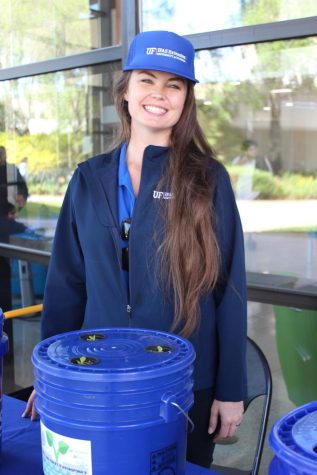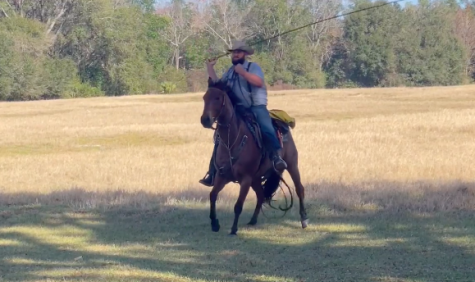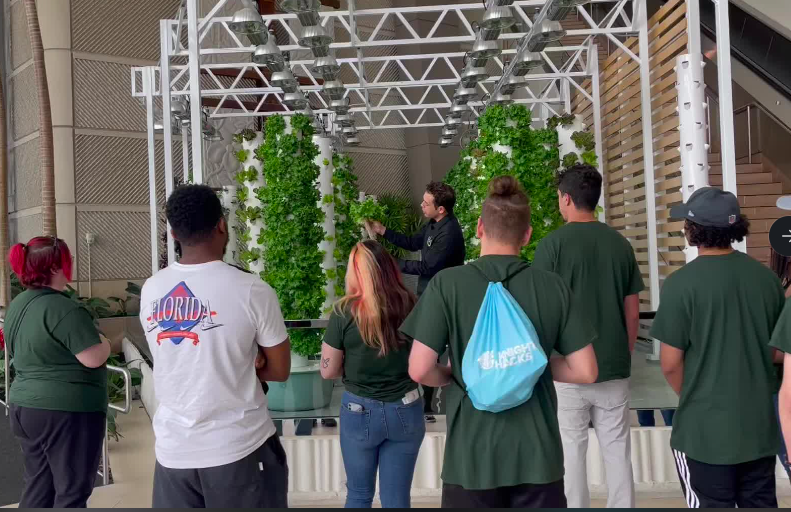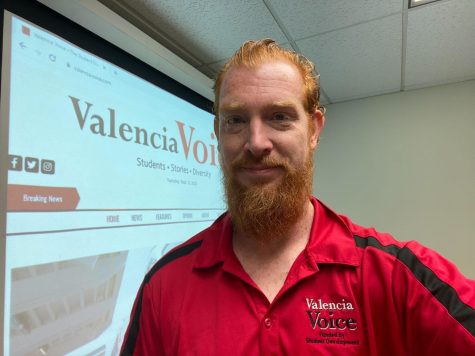Cows, Chickens and… Hydroponics?
That’s What This Agriculture Tour Is All About
March 7, 2023
3/21 Editor’s Note: Added UF/IFAS Coordinator Edie Gaythwaite and Hannah Wooten, information, quote, photo.
On Friday, February 10, about fifty Valencia College students participated in a special agricultural familiarization tour visiting various locations that are involved in local city agriculture.

In partnership with University of Florida’s Institute of Food and Agricultural Sciences (IFAS) Orange County Extension, the tour started at Ed Yarborough Ranch, Inc. on the agricultural portion of eastern Seminole county. The tour then proceeded to the small bio-intensive Everoak Farms, close to Valencia’s East Campus. The last two stops included the Orlando City’s Exploria Stadium and Urban Smart Farms tower garden technologies located inside Orange County Convention Center (OCCC).
Hannah Wooten, UF/IFAS Extension Orange County, discussed how farm tours became a reality for Valencia College. “My role is to communicate research from our scientists and identify trends and issues in the local community,” Wooten says. “Providing farm tours is really one of the best ways to break down the walls of the classroom and expose people to the successful agriculture practices from which people are engaging.”
Students can visit here for more information on UF/IFAS Orange County events. UF/IFAS Orange is also on Instagram @oc_extension.
Edie Gaythwaite, Valencia College Speech Professor and AS New Media, helped coordinate the farm tours. “I went to a Seminole fair tour and I thought, this is the coolest thing ever. My students would love this. With the help of UF/IFAS’s Hannah Wooten and Morgan Pinkerton, was able to get budget information, how this could work, and wrote for an endowed chair.” The tour was considered technologically-chronological; a ranch with cows and horses to turf grass. Then, the newer way of growing with an urban hydroponics farm in the middle of Orlando.
Gaythwaite was awarded the Patricia Havill Whalen Chair in Social Sciences Endowment.
Upon entering Ed Yarborough Ranch, Inc., in Geneva, Florida, students were welcomed by the Yarborough family, the farm owners. They told stories on how they acquired the land they had and some of the many struggles the family went through to keep the land. All of the family were present to give the tour members from Valencia College a warm welcome with fresh orange juice and a demonstration of how calves are trained to follow directions with a whip. The Yarborough family went into detail on how they run the ranch and how they take care of the cattle as well as the purposes of the cattle. Elder brother J.K. Yarborough explained, “We use every part of the cow, no part goes unused.” In addition to cattle farming, Yarborough received his Master’s Degree in Food Science from UF and is now part of their agriculture visiting faculty.
One student remarked how “the most interesting thing I learned was how to use property to farm and how to be self-sufficient”.

With the next stop being Everoak Farms, this stop was quite different from the previous stop. Everoak Farms is run by Mike Garcia with his wife Nikki. It is a small locally-owned family farm that is still a little new to the farming scene but has a lot to offer. Getting into the tour as you walk in on what looks like a small plot of undeveloped land in a residential area that you might often see across Orange County. Immediately the tour members were introduced to Garcia who explained how he began his career in the culinary arts before starting this farm in 2019. After a decade working as a chef in restaurants, he wanted to cultivate his own supply of livestock instead of buying from large suppliers.
Garcia explained that he only sells to local restaurants and businesses within ten miles of his farm to support the local economy. He also explains that he tries to focus on quick turnaround for things such as carrots and other vegetables. As you make your way through the farm you see all that is being grown on the farm such as peaches, broccoli, and lettuce. He also grows chickens in little coops that he sells on the farm. Garcia goes on to tell us that he plans to hold cooking classes in the future to really show how to make a chicken stretch. His goal is to make a civil pasturing farm dinner.
Student Alexandra Wetzel, Art Education, says the highlight of learning about Everoak was that this was started in Garcia’s backyard.
Afterwards, the group went to have a special lunch at Exploria Stadium, home of Orlando City Soccer, where in addition to being treated to magnificent views of the stadium from box seats and enjoying the catered sandwich meals, students got to hear about the upkeep of professional turf for athletes from Head Groundskeeper Bill Hoffer. Hoffer explained that sun coverage was important to keeping the grass well-maintained. In fact, the stadium’s roof design was incorporated to benefit the field conditions. Hoffer also explained how different machinery is used to measure the turf’s contents and quality. Also, since the stadium also hosts several events that are not just soccer games, preparing the field for all of those takes careful planning and coordination between the grounds team and the various event organizers.

The last big stop was the Urban Smart Farms stop at Orange County Convention Center near International Drive where owner and “farmpreneur” Diego Dutra and his team instructed the group about hydroponic farming. Dutra taught the visiting students how hydroponic growing works and all the things that he and his team were able to grow from hydroponic farming right inside large towers in one of the entry halls of the Convention Center. There were all types of things that were grown – from arugula, rosemary, and sage. Even stevia could be eaten where students tasted its sweetness. One of Dutra’s associates talked about how the water filters through the system to make sure the plants are getting their nutrients. The towers of plants that are being grown are not only active farms in an urban setting, but they also double as educational centers where convention visitors can learn about new breakthroughs in farming technology that challenges their preconceptions of what farms ought to look like. The team of farmers also talked about how they were using innovative technology in more than one way – even building a few prototype clips to set the plants on with 3D printers.

Overall, the farming tour is a great experience for anyone who was looking to learn or to get into farming as a hobby or career. Gaythwaite hopes to do this event again in the future.





